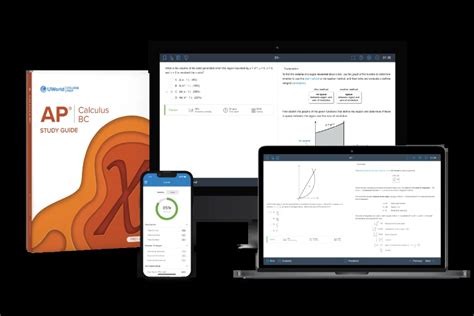Introduction
Are you gearing up for the AP Calculus BC exam? Congratulations on taking one of the most challenging and rewarding AP classes! This study guide will provide you with a comprehensive overview of the topics covered on the BC exam, as well as strategies and resources to help you succeed.

Exam Overview
The AP Calculus BC exam is a three-hour and 15-minute exam divided into two sections: Multiple Choice and Free Response.
Multiple Choice Section (50%)
- 45 multiple-choice questions
- 60 minutes
- Covers all exam topics
Free Response Section (50%)
- 6 free-response questions
- 95 minutes
- Includes a mix of short-answer and long-answer questions
Topic Coverage
The AP Calculus BC exam covers a wide range of calculus concepts, including:
Functions
- Polynomials, rational functions, algebraic functions, trigonometric functions
- Limits, continuity, derivatives, integrals
Differential Calculus
- Rates of change, related rates problems, optimization
- Derivatives of polynomial, rational, algebraic, trigonometric, logarithmic, and exponential functions
- Applications of derivatives (e.g., curve sketching, maxima/minima problems)
Integral Calculus
- Antiderivatives, integrals of polynomial, rational, algebraic, trigonometric, logarithmic, and exponential functions
- Applications of integrals (e.g., area under a curve, volume of solids of revolution)
Sequences and Series
- Sequences, series, convergence tests
- Taylor polynomials, power series
Strategies for Success
1. Start Early and Study Consistently:
Begin studying well in advance of the exam date. Dedicate a specific amount of time each day or week to review the material.
2. Understand Concepts Thoroughly:
Don’t just memorize formulas; strive to build a deep understanding of the concepts behind them. Focus on the “why”s and “how”s of calculus.
3. Practice, Practice, Practice:
Solve as many practice problems as possible. Regularly take practice tests to identify areas where you need improvement.
4. Utilize Resources:
Take advantage of online resources such as Khan Academy, AP Classroom, and Calculus-Help.com. Join AP Calculus study groups or seek tutoring assistance if needed.
5. Manage Your Time Wisely:
The exam is timed, so develop a strategy for allocating your time effectively between the Multiple Choice and Free Response sections.
Key Tips for Free Response Questions
1. Read the Question Carefully:
Pay close attention to the specific instructions and requirements of each question.
2. Show Your Work:
Write down all relevant equations, steps, and work. Partial credit can be earned even if your final answer is incorrect.
3. Use Clear and Concise Language:
Communicate your thoughts and solutions logically and efficiently.
4. Check Your Answers:
If time permits, double-check your answers and make any necessary adjustments.
Statistics and Benefits of Taking AP Calculus BC
According to the College Board, over 400,000 students took the AP Calculus BC exam in 2022.
- 60% of students scored a 3 or higher, qualifying them for college credit.
- Students who score well on the AP Calculus BC exam are more likely to succeed in college math courses.
- Taking AP Calculus BC can provide a strong foundation for careers in STEM fields.
Motivations for Studying Calculus
Pain Points:
- Struggling to understand calculus concepts
- Feeling overwhelmed by the workload
- Anxiety about the AP exam
Motivations:
- Improve your math skills and critical thinking abilities
- Prepare for college math and science courses
- Gain a competitive edge for college applications
- Explore potential careers in STEM fields
Applications of Calculus in Real-World Settings
Calculus finds applications in various fields, including:
- Physics (e.g., projectile motion, fluid dynamics)
- Engineering (e.g., structural analysis, fluid flow)
- Economics (e.g., marginal analysis, supply and demand)
- Computer science (e.g., computer graphics, data analysis)
- Medicine (e.g., drug delivery, medical imaging)
Resources and Study Plan
Official Resources:
- College Board AP Calculus BC website: https://apcentral.collegeboard.org/courses/ap-calculus-bc
- Khan Academy AP Calculus BC course: https://www.khanacademy.org/math/ap-calculus-bc
- AP Classroom: https://myap.collegeboard.org/portal/home
Study Plan:
-
Semester 1 (16 weeks):
* Introduction to functions
* Limits and derivatives
* Applications of derivatives
* Integrals -
Semester 2 (16 weeks):
* Applications of integrals
* Differential equations
* Sequences and series -
Review and Practice (4 weeks):
* Review all topics
* Take practice tests
* Seek additional support if needed
Tables
Table 1: AP Calculus BC Exam Timeline
| Phase | Date |
|---|---|
| Registration opens | August |
| Registration deadline | November |
| Exam dates | May |
Table 2: Exam Structure
| Section | Number of Questions | Time |
|---|---|---|
| Multiple Choice | 45 | 60 minutes |
| Free Response | 6 | 95 minutes |
Table 3: Pain Points and Motivations
| Pain Point | Motivation |
|---|---|
| Difficulty understanding calculus | Improve math skills |
| Overwhelmed by workload | Prepare for college math |
| Exam anxiety | Gain a competitive edge |
Table 4: Applications of Calculus
| Field | Application |
|---|---|
| Physics | Projectile motion, fluid dynamics |
| Engineering | Structural analysis, fluid flow |
| Economics | Marginal analysis, supply and demand |
| Computer science | Computer graphics, data analysis |
| Medicine | Drug delivery, medical imaging |
